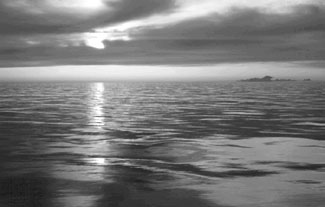56 Gaunilo: Pro Insipiente
The Reading Selection from Pro Insipiente
For example: it is said that somewhere in the ocean is an island, which, because of the difficulty, or rather the impossibility, of discovering what does not exist, is called the lost island. And they say that this island has an inestimable wealth of all manner of riches and delicacies in greater abundance than is told of the Islands of the Blest; and that having no owner or inhabitant, it is more excellent than all other countries, which are inhabited by mankind, in the abundance with which it is stored.
Now if some one should tell me that there is such an island, I should easily understand his words, in which there is no difficulty. But suppose that he went on to say, as if by a logical inference: “You can no longer doubt that this island which is more excellent than all lands exists somewhere, since you have no doubt that it is in your understanding. And since it is more excellent not to be in the understanding alone, but to exist both in the understanding and in reality, for this reason it must exist. For if it does not exist, any land which really exists will be more excellent than it; and so the island already understood by you to be more excellent will not be more excellent.”
If a man should try to prove to me by such reasoning that this island truly exists, and that its existence should no longer be doubted, either I should believe that he was jesting, or I know not which I ought to regard as the greater fool: myself, supposing that I should allow this proof; or him, if he should suppose that he had established with any certainty the existence of this island. For he ought to show first that the hypothetical excellence of this island exists as a real and indubitable fact, and in no wise as any unreal object, or one whose existence is uncertain, in my understanding.
|
From the reading… “…I know not which I ought to regard as the greater fool: myself, supposing that I should allow this proof; or him…” |
This, in the mean time, is the answer the fool could make to the arguments urged against him. When he is assured in the first place that this being is so great that its non-existence is not even conceivable, and that this in turn is proved on no other ground than the fact that otherwise it will not be greater than all things, the fool may make the same answer, and say:
When did I say that any such being exists in reality, that is, a being greater than all others?—that on this ground it should be proved to me that it also exists in reality to such a degree that it cannot even be conceived not to exist? Whereas in the first place it should be in some way proved that a nature which is higher, that is, greater and better, than all other natures, exists; in order that from this we may then be able to prove all attributes which necessarily the being that is greater and better than all possesses.
Moreover, it is said that the non-existence of this being is inconceivable. It might better be said, perhaps, that its non-existence, or the possibility of its non-existence, is unintelligible. For according to the true meaning of the word, unreal objects are unintelligible. Yet their existence is conceivable in the way in which the fool conceived of the non-existence of God. I am most certainly aware of my own existence; but I know, nevertheless, that my non-existence is possible. As to that supreme being, moreover, which God is, I understand without any doubt both his existence, and the impossibility of his non-existence. Whether, however, so long as I am most positively aware of my existence, I can conceive of my non-existence, I am not sure. But if I can, why can I not conceive of the non-existence of whatever else I know with the same certainty? If, however, I cannot, God will not be the only being of which it can be said, it is impossible to conceive of his non-existence.
|
From the reading… “Moreover, it is said that the non-existence of this being is inconceivable. It might better be said, perhaps, that its non-existence…is unintelligible.” |


